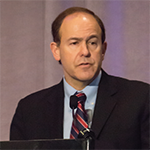
Brett Miles, MD, DDS
Researchers of a study that was awarded an honorable mention thesis by the Triological Society found that using high-resolution microendoscopy, which provides real-time visualization of mucosal surfaces of the upper aerodigestive tract, yields high levels of sensitivity and specificity. Researcher Brett Miles, MD, DDS, associate professor of otolaryngology at Mount Sinai Hospital in New York City, found that sensitivity and specificity in differentiating between benign and neoplastic mucosa was 96% and 95%, respectively, with an inter-rater reliability of 0.81. The technology, while it has technical limitations, has promise as a way for better intraoperative margin control, Dr. Miles said.
Explore This Issue
March 2016
Ian Jacobs, MD
In the second thesis awarded an honorable mention in 2015, researchers found that 13 of 15 rabbits survived after undergoing laryngotracheal reconstruction with hyaluronic acid using in vitro and in vivo tissue-engineered cartilage constructs, said Ian Jacobs, MD, medical director of the Center for Pediatric Airway Disorders at Children’s Hospital of Philadelphia. The constructs had become well integrated in the airway, supported respiration for the 12-week period, and were histologically and mechanically similar to autologous cartilage, he added. The findings suggest that in vitro and in vivo tissue-engineered approaches might be a viable new option to assist in pediatric airway reconstruction.
Thomas Collins is a freelance medical writer based in Florida.